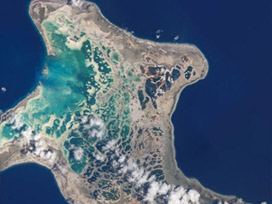By Janet Ekstract
CAIRO-On Sunday, The Conference of the UN Framework Convention on Climate Change (UNFCCC) known as COP27, wrapped up its last day with a historic deal where 200 countries agreed to set up a “loss and damage” fund for developing nations prone to climate disasters. Chair of the Alliance of Small Island States, Molwyn Joseph commented in a statement: “We have shown those who have felt neglected that we hear you, we see you, and we are giving you the respect and care you deserve.” Joseph added: “The agreements made at COP27are a win for our entire world.” Negotiators and non-governmental organizations lauded the fund whose creation was due in part to developing nations and small island countries speaking out much more vociferously.
Prior to Sunday, climate activists and world leaders had sharply criticized developed countries like the U.S. and China for not stepping up to compensate less developed nations for climate damage inflicted by them. The complicated points of COP27 included a debate about the efficacy of a “loss and damage” fund. Activists were disappointed that more attention was not paid to Africa’s climate crisis and also upset about the high number of gas and oil lobbyists that were present at COP27. A major conundrum remains the use of fossil fuel and effects from Russia’s war on Ukraine, that have forced a number of countries to increase their dependence on it. The entirety of the COP27 agreement reiterated their goal of maintaining global warming at 1.5 degrees Celsisus which was a key demand from many nations despite not using strong language about decreasing greenhouse gas emissions. The final agreement did not mention phasing out fossil fuels including oil and gas but it’s the first time that countries and groups including the U.S. and EU agreed to create a “loss and damage” fund where they had previously avoided the issue. Further, The Fossil Fuel Non-Proliferation Treaty criticized the final text of COP27 explaining that it was too late to phase out one fossil fuel at a time – “Governments must manage an equitable transition away from ALL fossil fuels.”
Meanwhile, Deputy Director of the Fossil Fuel Non-Proliferation Treaty Initiative, Rebecca Byrne told Turkiye’s Anadolu Agency that on many COP27 agenda items, major progress didn’t occur. Byrne said that many countries are still dependent on fossil fuels for basic revenue and economic development. She said one positive development was the “Santiago Network for Loss and Damage” that was created to connect developing countries with those who can provide technical assistance, knowledge and resources. Byrnes said that energy negotiations were heavily affected by the war on Ukraine. She added that Europe needs to find other sources of gas besides Russia, by expanding their renewable energy sources. As Byrnes explained: “So, we call on the Global North not to lock African countries into more gas development as a result of the Ukrainian war, but rather to actually invest in a proper sustainable and development pathway that’s based on renewables.”
In addition, U.S. President Biden said: “We see our mission to avert climate catastrophe and seize a new clean energy economy not only as an imperative for our present and future, but through the eyes of history.” Egyptian Ambassador and Special Representative to the COP27 president, Wael Aboulmagd had commented prior to COP27 that he is confident there remains a “firm commitment to climate action as a global priority,” adding “justice is central to achieving that.” He told The National: “COP27 is the implementation COP – and that means taking practical decisions not only about greater pledges, but how to turn those pledges into deliverables and action, and how to pay for that.” Aboulmagd emphasized: “We need to get real about what this means in practice. Well-meaning words are not enough; we need concrete steps towards cutting emissions, adapting to climate impacts already locked in and responding to loss and damage.” The Egyptian ambassador reiterated that more assistance must go to “countries and communities to protect themselves from the severe climate impacts that are already taking place at 1.1 degrees C to 1.2 degrees C warming, and the greater impacts that are already locked into the future, is a significant priority for our presidency.” He stressed that “funding for adaptation” was “historically” very low and “furthest from sufficient.” Meanwhile, World Wildlife Fund Deputy Climate and Energy chief Stephen Cornelius told the press that regardless of political issues that G20 countries conveyed “a strong message” to negotiators for a meaningful outcome to COP27. Cornelius remarked: “We can’t afford for the fossil fuel crisis to drive short-term decisions which will have long-term implications for climate change.”




